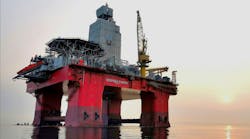Eric Watkins
Senior Correspondent
LOS ANGELES, June 23 -- Talisman Energy Inc. Calgary, eyeing a possible settlement of differences between the Iraqi central government and the northern Kurdish Regional Government (KRG), said two of its subsidiaries have entered into agreements with KRG for "interests" in Blocks K44 and K39.
Talisman said it will acquire a 40% interest in Block K44, with WesternZagros Ltd., holding 40% as operator and KRG retaining 20%. Talisman said it plans to spend $80 million on the block, including past costs and a three-well commitment.
Talisman also has entered into a seismic services agreement with KRG on Block K39 for a period of 2 years, following which Talisman will have the option to enter into a production-sharing contract (PSC) as operator of the block with a 60% working interest and a one well commitment in the first year. Talisman estimates exploration costs associated with the initial work program on this block to be $10-15 million.
Talisman Pres. and CEO John A. Manzoni said Block K44 is an established PSC area, "entered into by the KRG prior to the effective date of the new Iraqi constitution." He said the block is in the early stages of exploration with a well currently drilling. Both blocks are within the territory widely recognized as being on the KRG side of the 'Green Line' boundary that demarcates the region of Kurdistan within Iraq.
As part of the transactions with KRG, Talisman said it will pay $220 million plus further conditional contributions to KRG for financial support to infrastructure and capacity-building projects for the benefit of the people in the region, particularly local communities in the agreement areas.
Talisman also said KRG is bound to adhere to the principles of the Extractive Industry Transparency Initiative (EITI) pursuant to the Kurdistan Regional Oil and Gas Law. Talisman and KRG have confirmed their mutual commitment to revenue transparency in the spirit of the EITI, as well as to promoting respect for and compliance with human rights principles, including those set forth in the voluntary principles on security and human rights.
Agreement nears
The Talisman announcement coincided with reports that talks between KRG and the Iraqi central government will take place this week to try to settle their differences over a proposed new oil law for the country. A spokesman for the Iraqi government said major obstacles include a dispute over the rights of regional administrations to negotiate contracts with foreign oil firms and who has the final say in managing oil and gas fields.
KRG argues that Article 110 of the Iraqi constitution enshrines KRG's legal right to oil self-determination and limits the federal government's powers to such activities as providing national security and mail service and printing currency (OGJ, Apr. 14, 2008, p. 22).
As a result, the Kurds signed nearly 20 PSCs with a handful of international oil companies after drafting their own oil and gas law in August 2007—all of them considered illegal by the Iraqi Oil Ministry, which has threatened to blacklist companies that sign deals with the Kurds.
Earlier this month, analyst Global Insight said an agreement seems within reach between the Iraqi central government and KRG to "grandfather in" those companies that invested in Iraqi Kurdistan before February 2007—before the oil law dispute began. Such an agreement would allow them to develop their acreage fully, adding perhaps more than 100,000 b/d to Iraqi exports within 1 year and as much as 300,000 b/d within 2 years.
The analyst quoted officials from the Iraqi Oil Ministry and KRG's Energy Ministry as saying, "An agreement is virtually reached, with only technicalities precluding the final hook-up of the oil pipeline from DNO's Tawke field to the relatively near export metering station on the Kirkuk-Ceyhan crude pipeline running between the northern Iraqi oil-producing hub and the Turkish Mediterranean port."
Contact Eric Watkins at [email protected].
